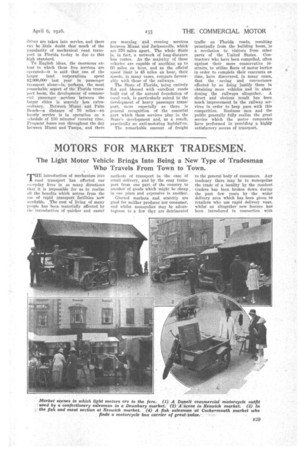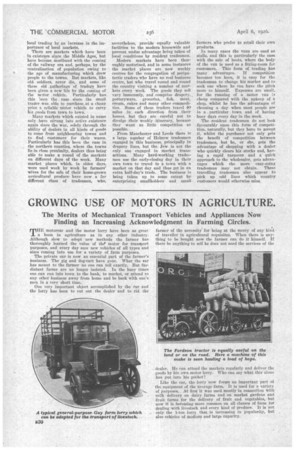MOTORS FOR MARKET TRADESMEN.
Page 13

Page 14

If you've noticed an error in this article please click here to report it so we can fix it.
The Light Motor Vehicle Brings Into Being a New Type of Tradesman Who Travels From Town to Town.
THE introduction of mechanism into road transport has affected our everyday lives in so many directions that it is impossible for us to realize all the benefits which accrue from the use of rapid transport facilities now available. The cost of living of many people has been materially affected by the introduction of quicker and easier methods of transport in the case of retail delivery, and by the easy transport from one part of the country to anotherof goods which might be cheap , in one place and expensive in another.
Glutted markets and seal-city are good for neither producer nor consumer, and whilst monopolies May be advantageous to a few they are detrimental
to the general body of consumers. Any tendency there may be to monopolize the trade of a locality by the resident traders has been broken down during the past few years by • the wider delivery area which has been given to retailers who use rapid delivery vans, whilst an altogether new feature has been introduced in connection with local trading by an increase in the importance of local markets.
There are markets which have been in existence since the Middle Ages, but have became moribund with the coming of the railway era and, perhaps, by the t2entralization of population owing to the age of manufacturing which drew people to the towns. But markets, like oldsoldiers, never die, and some of these old gatherings of traders have been given a new life by the coming of the motor vehicle.. Particularly has this been the case since the small trader was able to purchase at a cheap price a reliable Motor vehicle to carry his goods frerm town to town. • Many markets which existed in name only have si■rung into active existence again since the war, solely through the ability of dealers in all kinds of goods to come from neighbouring towns and to find customers for their Wares. Particularly has this been the case in the northern counties, where the towns lie in close proximity, dealers thus being able to make a round of the markets on different days of the week. Many market places which, in olden days, were used week by week by farmers' wives for the sale of their home-grown auricultural producehave now a far different class of tradesmen, who, nevertheless, provide equally valuable facilities to the modern housewife and prevent undue advantage being taken of local conditions by resident tradesmen.
Modern markets have been thoroughly motorized, and in some instances the market places are now weekly centres for the congregation of peripatectic traders who have no real bnsiuess centre, but who travel round and round the country visiting a number of markets every week. The goods they sell vary immensely, and comprise drapery,. potteryware, groceries, fish, meat, cream, cakes and many other commodities. Some of these traders travel 40 miles in each . direction from their homes, but they are careful not to divulge their weekly 'itinerary, beeause they want as little competition as posaible.
. From Manchester and Leeds there is a large number of Hebrew tradesmen engaged in this business, principally in drapery lines, but the Jew is not the only one engaged in market transactions. Many hard-working tradesmen use the early-closing day in their own town to travel to a town with a market on that day and thus get in an extra half-day's trade. The business is being taken up to some extent by enterprising smallholders and small farmers who prefer to retail their own products.
In many cases the vans are used as. stalls, and this is particularly the case with the sale of boots, where the body of the van is used as a fitting-room for customers. This form of trading has many advantages. If competition becomes too keen, it is easy for the tradesman to change his market and to seek one where he can have the pitch_ more to himself. Expenses are small, for the running of a motor van is cheap compared with the upkeep of a shop, whilst he has the advantages of choosing a -day when most people are in a particular town and of having busy days every day in the week
The resident tradesmen do not look .favourably upon this form of competition, naturally, but they have to accept it, whilst the purchaser not only gets the benefit of competition between tradesmen, but he, or she, gets the advantage of shopping with a dealer who quickly clears his stocks and, having a rapid turnover and a quick approach to the wholesaler, gets advantages which the more easy-going tradesman may not obtain. These travelling tradesmen also appear to pick up odd lines which country customers would otherwise miss.
































